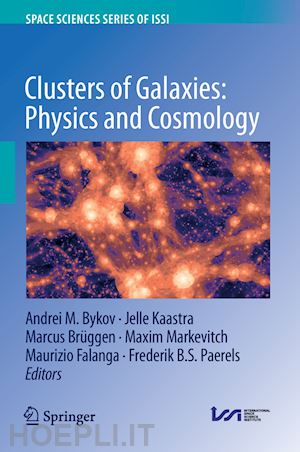Andrei Bykov is head of High Energy Astrophysics laboratory at Ioffe Institute of Physics and Technology, Russian Academy of Sciences and professor of St.Petersburg State Politechnical University. His principal research interests are theory and observations of processes in astrophysical objects with extreme energy release - supernovae, gamma-ray bursts, pulsar wind nebulae and clusters of galaxies. He is author and coauthor of over 200 scientific papers, a book Turbulence, Current Sheets and Shocks in Cosmic Plasma and editor of four books on high energy astrophysics.
Jelle Kaastra is a senior scientist at SRON and professor of high-energy astrophysics at Leiden University. He is an expert on high-resolution X-ray spectroscopy of cosmic plasmas, and is currently principal investigator of the Reflection Grating Spectrometer on XMM-Newton and the Low-Energy Transmission Grating Spectrometer on Chandra. He has an active track record on clusters of galaxies, active galactic nuclei and X-ray models for cosmic plasmas.
Marcus Bruggen is professor for extragalactic astronomy at the University of Hamburg. He is an expert in astrophysical fluid dynamics and high-energy astrophysics, and works both on theoretical and observational projects. Most of his work is concerned with the physics of the intracluster medium and its use as a physics laboratory. Currently, he coordinates the German involvement in the Low Frequency Array (LOFAR).
Maxim Markevitch is an astrophysicist at NASA Goddard Space Flight Center and a co-investigator of the forthcoming XRISM X-ray spectroscopy mission. He has studied galaxy clusters using multiple X-ray observatories, including Granat, ROSAT, ASCA, Chandra, XMM-Newton and Hitomi, as well as numeric simulations, and is a recipient of the Bruno Rossiprize of the American Astronomical Society for his work on the physics of galaxy clusters.
Maurizio Falanga received his university degree for Theoretical Physics and Astronomy at the University of Basel, Switzerland and his PhD degree in astrophysics from the University of Rome "La Sapienza”, Italy. He received the venia docendi in physics from the University of Basel in 2013 and his teaching now at the University of Bern. His scientific background is in high-energy astrophysics (hot universe and compact objects). Since 2009 he is the Science Program Manager at the International Space Science Institute (ISSI) in Bern, Switzerland. Between 2013 and 2019 he has been appointed as the founding Executive Director of the International Space Sciences Institute in Beijing, China. He is author and coauthor of about 200 published papers and editors of several books in his research fields.
Frederik Paerelsreceived his PhD from the University of Utrecht, Netherlands. He is currently the director of the Columbia Astrophysics Laboratory at Columbia University, New York and is currently serving as the director of undergraduate studies. His main scientific interests are in the physics of intergalactic medium, X-ray spectroscopy and X-ray instrumentation.











